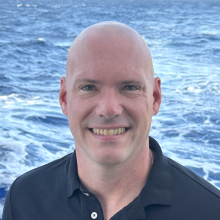
Mike Brennan
Tell us about your work/research. What kinds of things do you do?
I am a maritime archaeologist with a focus on deepwater shipwrecks. I started off working for Dr. Ballard and Nautilus in the Mediterranean and Black Seas while at the University of Rhode Island, but have begun to focus more on World War I and II wrecks now as an archaeologist with SEARCH. We are very interested in how these wrecks - now more than 100 and 75 years on the seabed - have interacted with the marine environment and what potential environmental hazards they could pose as they continue to corrode and degrade, including oil and fuel spills, chemicals, unexploded ordnance, etc.
What sparked your initial interest in your career?
My initial fascination with shipwrecks started with Ballard's discovery of the German battleship Bismarck in the Atlantic Ocean in 1989. I pursued this track of study and even sailed as a JASON Argonaut while in high school
Who influenced you or encouraged you the most?
Dr. Ballard's early discoveries and then working with him closely both influenced and encouraged me in the field.
What element of your work/study do you think is the most fascinating?
The discovery of a new shipwreck is always amazing. To approach slowly toward the target with the ROV, seeing it in the scanning sonar, and then eventually seeing it come into view on the video can never be matched.
What other jobs led you to your current career?
I worked as an expedition leader and archaeologist for Ocean Exploration Trust for many years.
What are your degrees and certifications?
Ph.D. Oceanography 2012 and MA Maritime History 2008 from URI
BA in Anthropology and Geology, from 2004 Bowdoin College
PADI Advanced Open Water Diver, Nitrox Diver, AAUS certified
What are your hobbies?
Since moving to Florida in 2017, I have gotten back into SCUBA diving and go as often as I can!
What advice would you give someone who wants to have a career like yours?
We may be out on a high-tech research vessel but the most important skill you can learn in school is WRITING. Being able to present yourself in email, letter, application, research paper, or grant proposal is the most important thing you can do for a career in science or archaeology
Expeditions
Mike participated in the following Ocean Exploration Trust expeditions:
